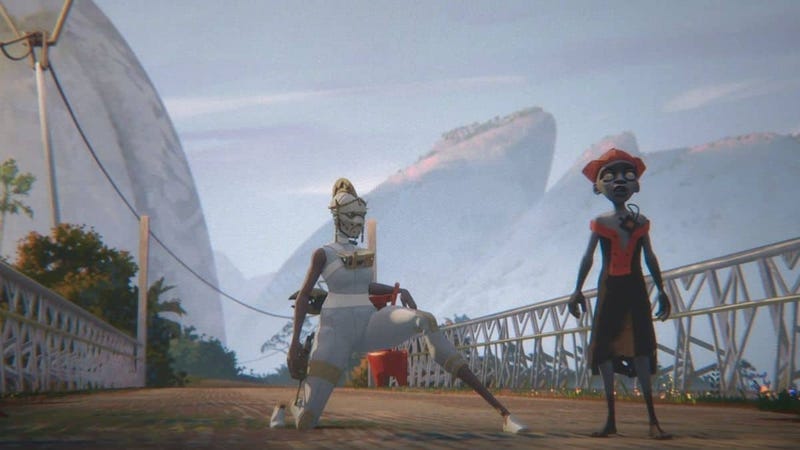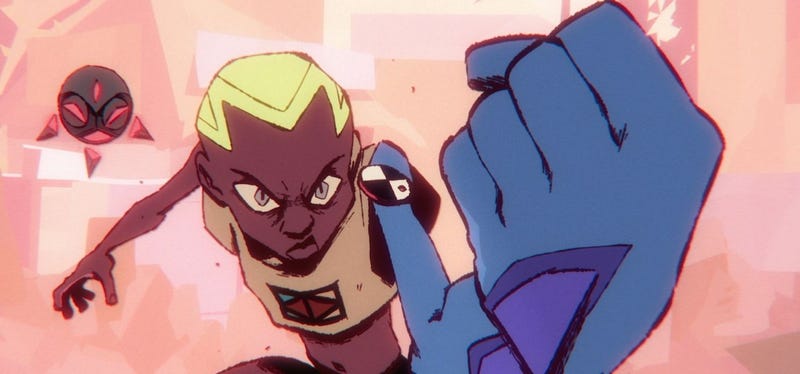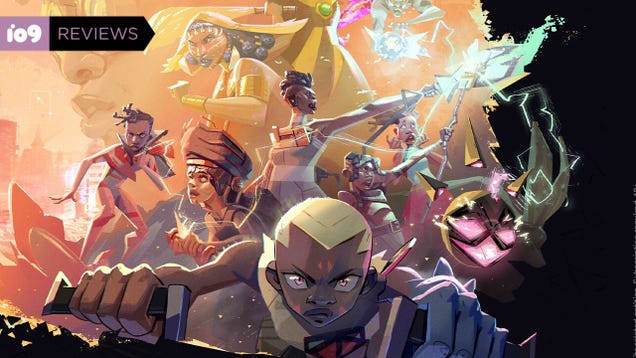The release of 2018’s Black Panther continues to make an impact on Disney’s output. You can see how the success of that movie (and its own sub-franchise) led to the creation of Shang-Chi and Ms. Marvel, and even non-MCU projects like American Born Chinese. Disney+’s Kizazi Moto: Generation Fire very much feels like part of the reason Disney picked it up in the first place was to scratch an itch for African science-fiction adventures that audiences may have had after seeing the two Panther movies.
Kizazi Moto is an animated anthology series of short films from creators across the African diaspora and its own animation industry. Across its 10-episode run, lead production house Triggerfish (working alongside other African studios such as Studio Meala) showcases a variety of Africanfuturism stories, which blend African culture and philosophy with sci-fi and fantasy elements, and have resulted in novels from authors like Tochi Onyebuchi and Nnedi Okorafor. With Peter Ramsey (co-director of Spider-Man: Into the Spider-Verse) on hand as an executive producer, the anthology’s consistently lovely animation and overall charm go a long way into making it one of the summer’s most pleasant surprises.
Nearly all the shorts have the importance of family as a central theme, and how a family unit helps inform who we are. Tshepo Moche’s First Totem Problems makes this quite literal with the clashing family members of its protagonist Sheba, who feels torn about what totem tattoos to get that will symbolize her maturity. Her excursion into the afterlife and meeting with a pair of ancestors (one from each side of her family) draws on the uncertainty that comes with growing up and stepping into adulthood. Its take on the next life isn’t too dissimilar from how something like Soul presents it as a massive office building, but what makes it interesting is the way it shows how the different sides of one’s family can inform everything about them. Sheba’s family’s constant bickering doesn’t get enough time to form as something really substantial, but the overlapping arguments throughout help you understand how that type of environment would be so deeply suffocating, regardless of the plane of existence it’s happening on.

Other shorts, such as Ng’Endo Mukii’s Enkai and Lesego Vorster’s You Give Me Heart, explore the idea of creation. Though they both dig into how making things essentially turns a person into a god, each of them runs with this in different ways. Heart’s exploration of social media-powered godhood is a sharp contrast from the mother deity of Enkai, who feels that she must do what she can to save the planet even as it’s actively killing her and worrying her daughter. But the way they both hone in on the idea of how creation exists as an expression of both godhood and love binds them together in a way that serve as nice closers to the entire anthology.
Personality comes through in each of the stories, particularly ones like Surf Sangoma (from directors Nthato Mokgata and Catherine Green). What makes that short all the more striking is how unexpectedly violent it gets and the different ways it teases out the dangers of its underwater world. Some surfers wear octopuses on their heads to improve their skills, and the process by which this happens looks equally painful and euphoric. Shofela Coker’s Moremi focuses on soul-sucking spirits hunting down a scientist and a spirit child, and has the vibe of a sinister fairy tale. Both shorts have uplifting endings, but their dips into horror provide some extra color to Kizazi Moto that’s more than welcome.
With constantly expressive characters and a fast, sometimes frenetic enrgy, Simangaliso Sibaya and Malcolm Wope’s Mkhuzi: The Spirit Racer feels like it’s playing in the space of Rise of the Teenage Mutant Ninja Turtles. Its focus on its world’s car combat is instantly striking, in part because of how it helps to make its lead character Manzo—a human/alien hybrid who can change his body at will—feel like he’s undergoing a superhero origin story. Maybe it can’t help but be that, since the titular spirit racer is said to protect the innocent and its story concerns Manzo’s neighborhood (set in a sci-fi version of the real life South African town Soweto) being taken over by a rival racer. Gentrification is a very real threat that hangs over plenty of communities, especially communities of color, making it exciting to see Manzo come into his own.
Given that this is a Disney series, there’s more than a little bit of superhero splash in Mkhuzi and Raymond Malinga’s Herderboys, which opens the entire series and features a young teen trying to prove himself to a trio of warrior herders. What makes the short so compelling is how easily it makes its setting feel alive. The cattle being herded are all part cyborg, and as they eat, their horns form crystals that are used to power their entire civilization. Strange and cool as it is to watch, it also feels comfortably familiar in the characters’ dynamics with each other. One of the herders is a robot without an actual head—the closest thing is a floating hat that lights up as he talks—but the way he needles his other teammates is recognizable and real.

Some shorts pair together naturally, and others—like the Ahmed Teliab’s Stardust and Tafadzwa Hove and Pious Nyenyewa’s Mukudzei—may be better off watching on their own. But if there’s one thing all 10 shorts share, it’s that they provide a glimpse into how a massively popular genre can be played around with when viewed through a different cultural lens. Much like with Disney’s other summer anthology hit Star Wars Visions (which Triggerfish worked on), Kizazi Moto has the juice, and it feels like it’s got the potential to become its best self if given the time to truly grow.
Kizazi Moto: Generation Fire’s 10-episode run is available now on Disney+.
